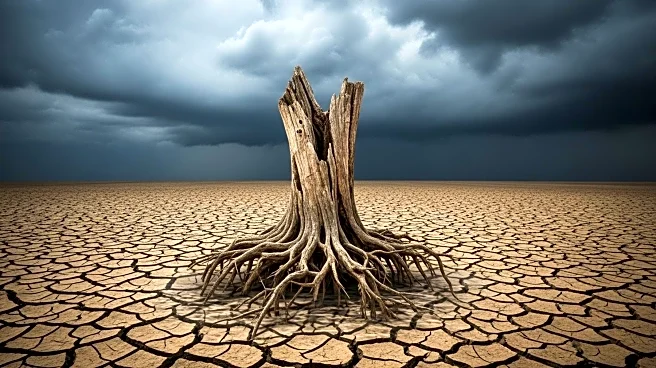What's Happening?
The federal government of Pakistan has declared a climate and agriculture emergency following devastating floods that have affected numerous districts, particularly in Punjab. The decision was made during a cabinet meeting chaired by Prime Minister Shehbaz Sharif. A special committee led by Planning Minister Ahsan Iqbal has been formed to recommend measures to mitigate the economic impacts of the floods. The climate minister, Musadik Malik, has been tasked with submitting a comprehensive report within 15 days to address the challenges posed by climate change. The cabinet discussed the destruction to agriculture and human and financial losses in detail, emphasizing the need for provincial cooperation to address these challenges.
Why It's Important?
The declaration of a climate and agriculture emergency highlights the severe impact of climate change on Pakistan's economy and food security. The floods have affected millions of people and animals, and damaged thousands of villages, exacerbating fears of food inflation. The government's response aims to assess the damage to agriculture and compensate farmers, which is crucial for stabilizing the economy and ensuring food supply. The involvement of provincial governments underscores the need for a coordinated effort to tackle climate change and its effects, which could serve as a model for other countries facing similar challenges.
What's Next?
The government plans to convene an apex-level meeting with all provincial stakeholders to formulate a comprehensive strategy to address climate change. The special committee will devise terms of reference to guide its recommendations. The cabinet has also lifted a ban on new gas connections, aiming to provide more affordable energy to the public. Efforts to enhance local gas production are underway to reduce dependency on imported liquefied natural gas. The trilateral agreement with Uzbekistan and Afghanistan for a joint feasibility study on regional trade and connectivity is expected to boost economic cooperation.
Beyond the Headlines
The emergency declaration may lead to long-term shifts in Pakistan's approach to climate change, including increased investment in sustainable agriculture and infrastructure. The focus on regional trade and connectivity could enhance economic resilience against climate-related disruptions. The lifting of the gas connection ban reflects a broader strategy to improve energy security and affordability, which is critical for economic stability.










